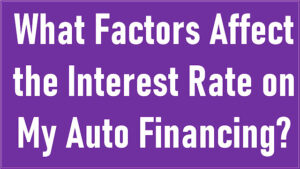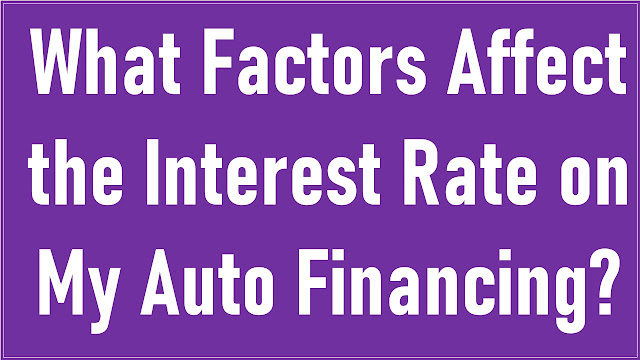
Introduction.
In this article, I’ll delve into the intricate world of auto financing, shedding light on the factors that influence the interest rate you’ll pay when purchasing your dream car. Auto financing is a common path for many individuals looking to acquire a vehicle, and understanding the key elements affecting the interest rate can save you money and help you make informed financial decisions.
The interest rate on your auto loan is not arbitrary; it’s determined by a combination of personal and market-related factors. By grasping the nuances of this financial landscape, you’ll be better equipped to secure favorable financing terms and pave the way for a smoother journey towards owning that coveted set of wheels. Let’s embark on this journey of unraveling the mysteries behind auto loan interest rates, empowering you to make sound financial choices when purchasing your next car.
- Credit score and history impact auto loan interest rates.
- Loan term length influences car financing interest rates.
- Market conditions affect auto loan interest rate fluctuations.
- Down payment size can lower or raise car loan rates.
- Vehicle type and age can impact auto loan interest.
- Lender choice and negotiation skills influence car loan rates.
Credit score and history impact auto loan interest rates.
Your credit score and credit history play a significant role in determining the interest rate on your auto loan. Lenders use your credit score to assess your creditworthiness and the risk of lending to you. Borrowers with higher credit scores (typically 700 or above) are considered less risky, and they often receive lower interest rates. On the other hand, borrowers with lower credit scores may be offered higher interest rates to compensate for the perceived risk.
Lenders also consider your credit history, which includes factors like the number of open accounts, payment history, and any past delinquencies. A positive credit history can help secure a lower interest rate, while a negative history may result in a higher rate or even loan rejection. It’s essential to maintain good credit practices, such as making timely payments and reducing outstanding debt, to improve your chances of securing a favorable auto loan interest rate.
Loan term length influences car financing interest rates.
The length of your auto loan term also affects the interest rate you’ll be offered. Typically, longer loan terms result in higher interest rates. This is because lenders take on more risk with longer terms, as there’s a longer period for economic conditions, your financial situation, and the vehicle’s value to change. Therefore, borrowers opting for extended loan terms may find themselves paying more in interest over the life of the loan. Conversely, shorter loan terms, like 36 or 48 months, often come with lower interest rates as they pose less risk to the lender.
While longer terms can reduce monthly payments, it’s essential to weigh the impact on your overall financial health and consider your ability to pay off the loan within the agreed-upon time. A shorter term may save you money in the long run by reducing the total interest paid, while a longer term can offer lower monthly payments but at the cost of higher overall interest expenses.
Market conditions affect auto loan interest rate fluctuations.
Auto loan interest rates are influenced by broader market conditions and economic factors. These conditions include changes in the federal funds rate, inflation, and the overall health of the economy. When interest rates set by the central bank rise, it often leads to higher auto loan interest rates. Conversely, in periods of economic stability or slowdown, rates may be more favorable to borrowers.
It’s important to keep an eye on market conditions when considering an auto loan. Timing your purchase during periods of lower interest rates can save you money on your financing. For example, when central banks lower interest rates to stimulate economic activity, it can be a good time to secure an auto loan at a more attractive rate.
Down payment size can lower or raise car loan rates.
The size of your down payment can have a significant impact on your car loan interest rate. A down payment is the initial amount of money you pay upfront when purchasing a vehicle. The larger your down payment, the less you need to borrow, which can result in a lower interest rate.
Lenders often offer better terms to borrowers who make substantial down payments because they perceive them as lower risk. A larger down payment not only reduces the amount you need to finance but also demonstrates your commitment to the purchase. As a rule of thumb, a down payment of 20% or more of the car’s purchase price is often associated with more favorable interest rates. However, the minimum down payment requirements may vary among lenders, so it’s essential to understand their specific criteria.
Vehicle type and age can impact auto loan interest.
The type and age of the vehicle you’re purchasing can also affect the interest rate on your auto loan. Lenders may offer different rates for new and used cars. New cars often come with lower interest rates because they are considered less risky investments due to their reliability and warranty coverage. On the other hand, used cars, especially older models, can come with slightly higher interest rates.
Additionally, the specific make and model of the vehicle can influence the interest rate. Lenders may view certain cars as more reliable, retaining value better, and therefore offering lower interest rates on loans for these vehicles. Before purchasing a car, it’s wise to research how the type, age, and make/model of the vehicle might impact the interest rate you’re offered, and consider these factors when making your decision.
Lender choice and negotiation skills influence car loan rates.
The lender you choose and your negotiation skills can significantly influence the interest rate on your auto financing. Different lenders, such as banks, credit unions, and online lenders, offer varying interest rates and terms. Shopping around and comparing offers from multiple lenders can help you find the most competitive rate available to you.
Your negotiation skills also come into play when securing an auto loan. If you’re a well-informed and confident borrower, you may be able to negotiate a lower interest rate with the lender. Factors such as your creditworthiness, the competitiveness of the lending market, and your ability to make a persuasive case can all contribute to your success in negotiating a favorable rate. Remember that it’s often beneficial to get pre-approved for a loan from different lenders before visiting a dealership, as this can provide you with a stronger bargaining position.
Conclusion.
I hope this exploration of the factors influencing auto financing interest rates has shed light on the complexities of this crucial aspect of car ownership. In conclusion, it’s evident that your credit score plays a pivotal role in determining the interest rate you’ll receive. Maintaining a strong credit profile is essential for securing a favorable deal. Lenders also consider the loan term, with shorter terms often resulting in lower rates. It’s crucial to shop around for the best offers, as different lenders may have varying terms and conditions. Additionally, your down payment and the type of vehicle you choose can impact the interest rate. A substantial down payment and opting for a new, reliable vehicle may lead to better rates.
Furthermore, economic conditions and fluctuations in the market influence interest rates. Keeping an eye on these external factors can help you time your purchase for more favorable rates. In the end, being an informed and responsible borrower is key to obtaining the most favorable auto financing terms. Understanding the interplay of these factors will empower you to make well-informed decisions, ensuring that your auto financing aligns with your financial goals and capabilities.
